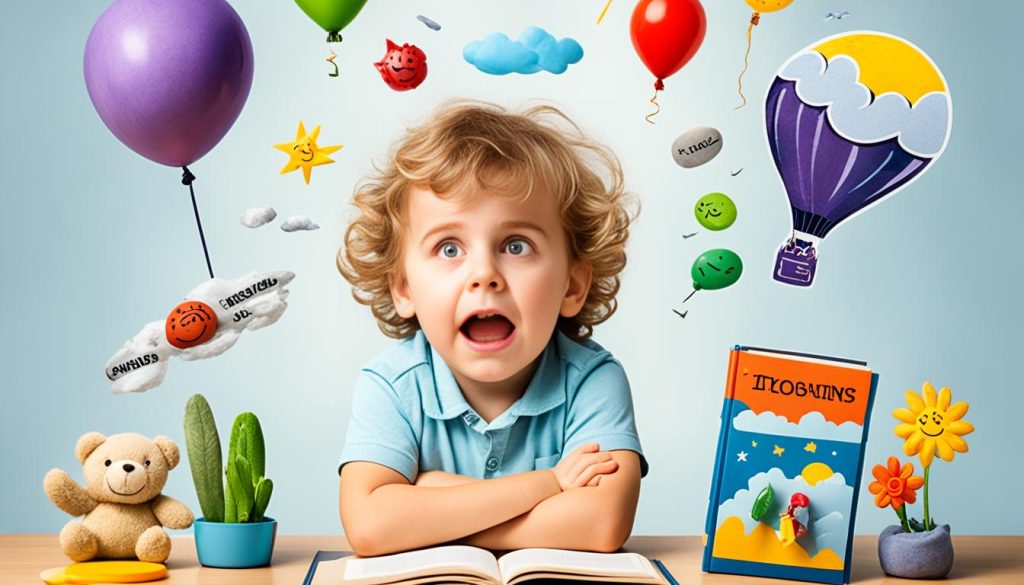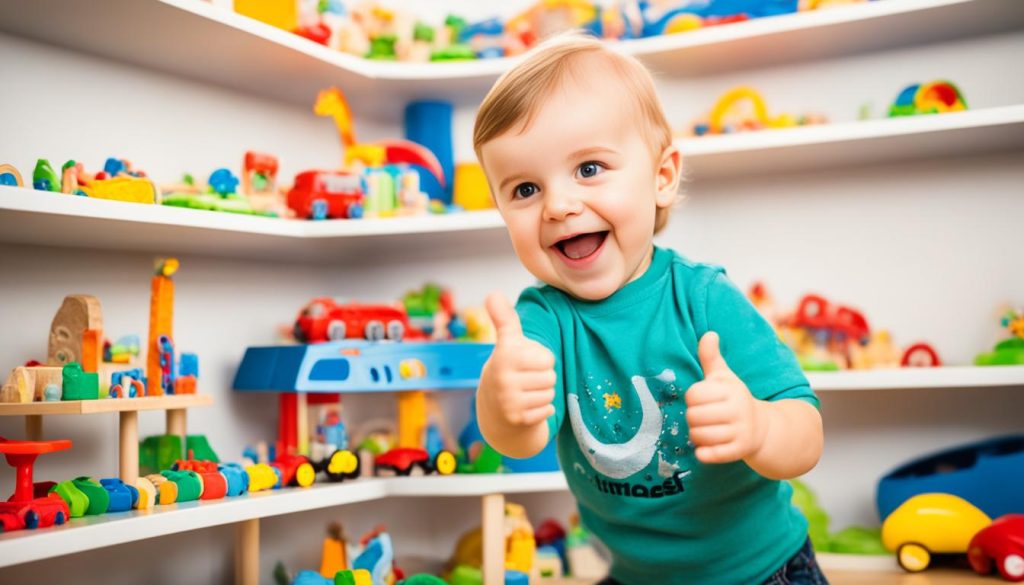Have you ever seen your child try to help out at home and felt proud? This is where responsibility starts. Teaching kids to be responsible is more than just getting chores done. It’s about helping them grow into capable adults. As a parent, you’re key in this journey, from when they’re toddlers to teens.
It’s in moments like a 3-year-old cleaning their dishes or a 5-year-old making their bed that kids learn the value of helping. By giving them tasks that fit their age and praising them, you’re doing more than saving time. You’re giving them a sense of purpose and belonging. These are important for their growth and positive parenting.
Studies show that kids who help at home are more likely to help in other situations. This shows that early responsibility can lead to better social behavior. By involving your kids in tasks like cleaning the table or washing the car, you teach them important life skills. You’re teaching them to be responsible, understand cause and effect, and contribute positively to society.
Key Takeaways
- Encouraging kids to help with household tasks fosters responsibility.
- Age-appropriate chores build developmental milestones.
- Praise and positive reinforcement strengthen responsible behavior.
- Tasks should increase gradually respecting each child’s pace.
- Responsibility learned at home translates to broader contexts.
- Involving kids in decision-making promotes independence.
Understanding Responsibility in Child Development
Teaching kids about responsibility early on helps them see they’re part of a bigger group, like a family or society. Even if they think they’re the center of the world, showing them how to be responsible can help. This can shape their behavior as they get older.
The Importance of Teaching Responsibility
It’s key to teach kids about responsibility to help them become independent. They need a place where they can learn and grow, developing important skills. Things like empathy and sharing help them do well in school and life.
Studies show that clear instructions help kids understand what’s expected of them. This can make them less anxious and depressed. It also helps them avoid acting out.

Psychological Benefits of Responsibility
Being responsible is good for kids’ minds. It boosts their self-esteem and makes them feel like they belong. Kids who get along with others and adults are more likely to succeed as adults.
Letting kids face the consequences of their actions teaches them about responsibility. This helps them develop a strong work ethic and self-reliance. It’s important for their future.
Parents’ parenting style is influenced by their kids, their own experiences, and their family and culture. Using an authoritative style can help kids develop emotional intelligence, resilience, and important life skills.
Starting Early: Responsibility for Toddlers
Teaching toddlers about responsibility early on is key for their growth. By giving them simple tasks, they learn the importance of being responsible. These lessons are crucial for Building Self-Esteem in Children and starting good habits.

Age-Appropriate Duties for Toddlers
Toddlers can start with tasks like putting away toys, picking their snacks, and helping with small chores. These tasks make them feel powerful and increase their confidence. Parents say that:
- 43% of respondents emphasized focusing on showing love and value to their children.
- 32% highlighted avoiding old-fashioned parenting styles or negative experiences from their own childhood.
- 25% emphasized open communication and emotional connection.
Positive Reinforcement Parenting Strategies
Positive Reinforcement Parenting is a great way to teach responsibility. By praising toddlers for trying, not just doing well, they keep getting better. It also helps Encouraging Child Creativity in solving problems. Instead of bribes, use positive words and celebrate their wins to create a habit of being responsible. Data shows that:
- 12% of parents prefer gentler parenting methods, avoiding physical punishment.
- 18% support encouraging independence and decision-making in children.
- 15% mention the importance of cultivating strong family beliefs to instill responsibility.
Using these methods helps toddlers take ownership of their actions. They learn to be responsible early on.
Responsibility Activities for Preschoolers
Getting preschoolers involved in responsibility activities is key to getting them ready for kindergarten and later life. At this age, kids love to do things on their own. It’s a perfect time to teach them responsibility with everyday tasks and fun activities.

Involving Preschoolers in Household Tasks
Letting your preschooler help with household chores teaches them important skills. It also boosts their self-esteem and makes them feel proud of what they do. Start with easy tasks like setting the table, helping with laundry, or putting away toys. These tasks are a great way to introduce them to responsibility and get them ready for kindergarten.
Preschoolers can also help with simple tasks like feeding the pet or watering plants. These tasks teach them to care for others and their environment. It’s a way to support their mental health.
Fostering Independence in Preschoolers
It’s important to help preschoolers become independent early on. Let them dress themselves, make simple choices, and prepare easy meals with your supervision. This helps build their confidence and teaches them to think and make decisions.
Try creative activities that show the value of following rules and making choices. Games like ‘Simon Says’ are fun ways to teach kids about responsibility and creativity. They learn about the effects of their actions in a fun way.
Building Self-Esteem in Kindergarteners
Kindergarteners love to show they can do things on their own, both at school and at home. Helping them with family tasks boosts their self-esteem. It’s also key to make sure they have enough time to play and explore creatively. We’ll look at ways to get kids involved in family tasks and how to balance work and play.
Encouraging Participation in Family Tasks
Getting kids involved in family tasks helps build their confidence and sense of worth. Letting them do small chores like setting the table or feeding pets makes them feel important. Studies show that loving relationships and balanced feedback are key to growing self-esteem in kids.
- Let kids choose things like what to wear or what activity to do next. This helps them make decisions.
- Tell them you love and accept them no matter what they do.
- Give them different tasks to keep them interested and help them learn many skills.

Balancing Play and Responsibility
It’s vital for kids to have responsibilities, but they also need time to play and be creative. Encouraging them to try different hobbies and play helps their minds and hearts grow. It’s important to set clear limits so they don’t feel too stressed.
“Trying new things is a big part of learning. Giving kids chances to succeed and face challenges helps build their self-esteem.” – Linda Carter, Child Development Specialist
Keeping a good balance between work and play helps kindergarteners become resilient and think positively. When parents show confidence and readiness, it helps kids feel the same way. This prepares them to handle challenges in the future.
In short, setting clear limits and getting kids involved in family tasks helps their self-esteem and growth. Doing hobbies and playing also boosts their confidence and identity. This gets them ready for the challenges ahead.
Establishing Responsibility in School-Aged Children
As kids start school, they learn more about responsibility. Giving them chores like walking the dog or making lunch helps them feel accountable. It’s important to guide them but also let them be independent, teaching them respect and empathy.
The Role of Chores in Child Development
Chores are key in teaching kids about routines and time management. They help kids feel structured and responsible. Kids with high self-esteem are more likely to be responsible, like admitting mistakes and finishing tasks.
On the other hand, kids who get too much might not want to do anything themselves. They might expect others to do tasks for them and not be thankful. Jean Illsley Clark’s research shows that giving kids too many things can lead to this.
Parents should make sure kids help out at home. Giving them tasks they can do well helps build their confidence and sense of responsibility.
Effective Discipline Strategies to Encourage Responsibility
It’s important to use good discipline to teach kids to be responsible. Parents should be loving but also set clear rules and consequences. This helps kids see how their actions affect others and themselves.
Letting kids help out makes them feel important and valued. Asking them to think instead of just telling them what to do helps them remember their tasks. This way, they can do things on their own.
Talking to kids and teaching them new skills helps them become responsible. Letting them make mistakes and deal with the results teaches them a lot. It’s important not to call them irresponsible but to see mistakes as chances to learn.
Studies show that using rewards and consequences can help kids be more responsible. Praising them for doing well encourages them to keep it up. But it’s important not to make their self-worth depend on their actions. A good balance of guidance and freedom helps kids understand their role in the family and develop social skills.
Parenting and Raising Kids: Sibling Involvement in Responsibilities
Parenting is a journey filled with chances to teach important life skills. It’s key to balance fairness and support each child’s unique identity. Handling sibling rivalry over chores can make the home more harmonious and teach kids to be thankful. Research shows siblings share traits only about 20 percent of the time. So, it’s vital to adjust parenting to each child’s needs.
Experts like clinical psychologist Dr. Becky Kennedy stress the need for customized parenting. They say sibling rivalry is normal and aims for parents’ favor. Creating a respectful and empathetic home helps strengthen the bond between parents and kids.
Handling Sibling Rivalry Over Responsibilities
Teaching kids to negotiate, be fair, and appreciate each other’s work is key. Seeing sibling conflicts as chances to grow emotional intelligence and negotiation skills can make things better. Tailoring discipline and support to each child’s needs can reduce rivalry. Praising each child’s talents and skills can stop competition and boost their self-esteem.
Using Family Respect and Empathy
Building family respect and empathy takes effort and smart strategies. Encouraging siblings to share tasks helps them respect and understand each other. As they learn to value each other’s efforts, the family gets stronger. Doing activities together like movie nights or hobbies can lessen stress and improve sibling ties. Teaching kids to be thankful for their siblings’ help and achievements strengthens this bond.
Finally, giving siblings tasks they can handle is good. Research shows it teaches them to be independent and responsible. But, make sure these tasks aren’t too hard for them.
| Key Strategy | Description |
|---|---|
| Managing Sibling Conflict | Use expert advice to solve conflicts in a good way. |
| Individual Needs | Adjust parenting to fit each child’s personality and what they need. |
| Teaching Responsibility | Give tasks that fit their age to help them feel independent and grateful. |
| Building Empathy | Do activities that bring the family closer and teach respect for each other. |
| Resourcefulness | Apply expert tips and parenting workshops to improve your parenting. |
For more info on supporting your child’s mental health during these times, check out this helpful resource.
Teaching Responsibility Through Financial Literacy for Kids
Teaching kids about money early on is key to teaching them responsibility. Talking about family finances often, as financial expert Jen Hemphill suggests, shows the value of managing money. Getting kids involved in money decisions helps them learn for life.
Introducing Allowance as a Responsibility Tool
Allowances can be a great way to teach kids about money. Hemphill says the amount should match the child’s age and be based on tasks like feeding pets or organizing yard sales. This approach teaches kids about responsibility and the value of their money.
Managing Child Savings and Spending
It’s important to guide kids on saving and spending their allowance. Saving should be seen as a key financial habit to start early. Activities like counting change or selling lemonade teach important skills like budgeting and setting goals. These lessons help kids learn to manage money responsibly for the future.
| Activity | Responsibility | Financial Lesson |
|---|---|---|
| Feeding Pets | Consistency in Duties | Earning Allowance |
| Organizing Yard Sales | Initiative and Effort | Income Generation & Budgeting |
| Rolling Loose Change | Attention to Detail | Money Management |
| Lemonade Stand | Planning and Execution | Entrepreneurship Skills |
| Charitable Giving | Empathy and Community Involvement | Philanthropy |
Managing Screen Time and Responsibility
In today’s world, managing screen time is key for parenting in the digital age. Too much screen time can harm kids, causing hyperactivity and lower IQ. It’s important to set limits and encourage good screen use to raise responsible kids.
Setting Boundaries with Kids on Digital Use
Setting clear limits is a first step in managing screen time. Kids often spend 6-8 hours a day in front of screens, which takes away from important activities like homework and play. Setting limits after chores are done makes screens a reward, not a right.
Parents can use device settings, parental codes, or block internet access to enforce these limits. Dr. Dimitri Christakis says fast-paced TV and games make it hard for kids to focus on tasks that need thought. So, it’s important to watch how much screen time kids get.
Encouraging Productive Screen Activities
Limiting screen time is key, but promoting good digital use is just as important. Touchscreen tablets can help kids learn to read, showing not all screen time is bad. Educational apps and videos can teach kids a lot.
Exposure to screens can help with language skills when balanced with other learning. Using interactive and educational content is good parenting in the digital age. It helps kids learn and grow from their screen time.
In conclusion, managing screen time means setting limits and promoting learning. This balance teaches kids to be responsible. It links screen time to learning and sets clear rules for fun use.
The Importance of Outdoor Play in Teaching Responsibility
Outdoor play is key in teaching kids about responsibility. It’s more than just fun; it’s good for their health.
Encourage kids to play outside several times a day. This helps them connect with nature and build good habits. For older kids, joining junior sports is a great way to learn responsibility and have fun.
Babies get more comfortable with the world by playing outside. Toddlers enjoy activities like throwing, chasing, walking, and running. For preschoolers, games like chasey and hide-and-seek make them love playing outside.
As kids get older, they join more structured activities. But, they still need free play outside to keep developing healthy habits.
Letting kids take risks is important. Running, climbing, and jumping teach them to learn from mistakes. This kind of play helps kids grow and stay healthy.
Children who play outside a lot have more energy and are less likely to be obese. They learn to bounce back from mistakes, which is good for their development.
Today, kids spend about seven hours a day on screens. This has led to more kids being overweight. In 1980, only 7% of kids were obese, but now it’s one in three.
Outdoor play helps kids get better at moving, like being agile and balanced. It also makes their muscles stronger. Activities like biking and skateboarding are great for this.
Being outside is good for kids’ feelings and helps their immune system. It lowers the risk of many health problems. It also gives them vitamin D, which is important for strong bones and health.
The benefits of outdoor play are huge. It teaches kids responsibility and helps them grow in many ways. By letting kids play outside, you help them stay healthy and support their development.
Developing Social Skills and Emotional Intelligence in Children
It’s key to help kids grow their social skills and emotional smarts for their future. Studies show that good parent-child communication techniques are crucial. They help kids get better at social interactions.
Parent-Child Communication Techniques
Creating a strong bond with kids means talking openly and supporting each other. A 2007 study found that kids learn how to manage feelings by watching their parents. When parents listen well and respond with the right emotions, the family feels better.
Here are some ways to improve communication:
- Let kids share their feelings through words, pictures, or writing.
- Listen actively to show you care and understand them.
- Support good feelings and show how to handle emotions well.
- Try games like the Conversational EQ card game to help kids learn about feelings and social skills.
Building a Growth Mindset in Kids
Helping kids believe they can grow and learn from challenges is key. This mindset makes them see problems as chances to learn, not just hurdles. Here’s how parents can help:
- Give feedback that talks about trying hard and getting better, not just results.
- Help kids solve problems, as most parents think this is vital for success.
- Encourage kids to do things on their own, which boosts their confidence and self-knowledge.
- Use mindfulness like deep breathing and meditation, which many parents find helps with feelings.
By being consistent and thoughtful, parents can greatly help kids with developing social skills and emotional smarts. These actions improve effective parent-child communication. They also help build a strong growth mindset in kids.
Integrating Responsibility into Family Traditions and Rituals
Family traditions and rituals are great ways to teach kids about responsibility. By adding responsibilities to these activities, kids learn the value of helping out. This helps them understand their role in the family and their cultural background.
Studies show that these practices are good for kids. They help with identity, health, school performance, and family happiness.
Adding responsibilities to family activities teaches kids important life skills. It shows them the value of helping out and being part of a community. Family routines and rituals give kids a sense of stability and help them adjust to big changes.
For example, having regular family dinners is good for kids. It helps them do better in school, feel happier, and be less likely to engage in risky behaviors.
Family volunteering teaches kids about being kind and responsible. Working together on projects shows them the importance of hard work and responsibility. Activities like helping with holiday meals or setting up for family events teach kids about their role and the value of their efforts.
Adding diversity to family traditions helps kids understand and respect different cultures. Celebrating festivals from around the world exposes them to new traditions. This broadens their view and teaches them about the importance of diversity.
Here are some tips for making family traditions work:
- Make it Fun: Make sure the tasks during traditions are fun and seen as special.
- Be Consistent: Being regular helps build a strong routine. It makes kids feel secure and part of the family.
- Adapt as Needed: Change the tasks based on what kids can do and what they like.
- Emphasize Learning: Point out the lessons kids learn, like teamwork and empathy.
By adding responsibilities to family traditions, you teach kids important life skills. This approach strengthens family ties and helps kids become responsible, caring individuals ready to make a difference in the world.
Conclusion
Teaching kids responsibility is a big job that needs a full approach. It starts with helping toddlers be independent and grows into making family traditions. Each step helps kids become thoughtful and willing to help. Studies show that how parents act and the culture they share with kids really matters.
Building resilience in kids is key. Parenting styles like authoritative and positive help kids deal with tough times. Having both parents involved early helps kids avoid depression and bad behaviors. This helps kids grow well emotionally and mentally.
Talking to kids about hard topics and teaching them about money prepares them for life. This helps make kind kids ready for the world. Parents can guide them with both lessons and support. This way, kids are set for a bright, responsible future.
FAQ
How can I teach responsibility to young children?
Why is teaching responsibility important in child development?
What are the psychological benefits of teaching responsibility to children?
What responsibilities are suitable for toddlers?
How can positive reinforcement help in teaching responsibility?
How can I involve preschoolers in household tasks?
How can I foster independence in preschoolers?
What strategies can help build self-esteem in kindergarteners through responsibility?
How can school-aged children benefit from chores?
How can effective discipline strategies encourage responsibility?
How can responsibility be shared among siblings?
How does financial literacy teach responsibility to kids?
How can screen time be managed responsibly?
Why is outdoor play important in teaching responsibility?
How can parent-child communication build emotional intelligence and social skills?
How can family traditions and rituals instill responsibility in children?
This post contains affiliate links. If you click on a link and make a purchase, I may earn a small commission — at no extra cost to you. Thank you for supporting this blog and helping me keep the patterns free! Read the full Affiliate Disclosure & Transparency.
